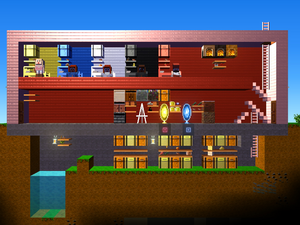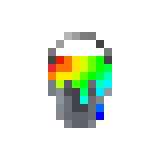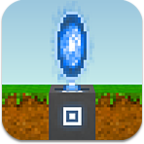Paint
| Paint | |
|---|---|
|
| |
| Category | Tool |
| Use | Decorating |
| Tool | |
| Stackable | Yes (99) |
- "Splash some color around."
Paint is a tool for decorating a world by changing the color of blocks and back walls.
Appearance
Paint appears in a blockhead's inventory as a bucket overflowing with a liquid of its color. Different colors of paint are treated as different items in inventory and cannot be stacked with each other. The same paint color made using a different pigment order cannot be stacked together (eg. orange from red + yellow cannot stack with the same orange from yellow + red).
There is currently a total of 148 possible combination of different colored paints.
Where Found
A mixing bench is used to create paint from a tin bucket, five oil, and one to three units of pigment. The color of paint produced depends on the combination of dyes used, selected within the mixing bench menus. The level of the mixing bench is equal to the maximum number of dyes allowed for that mixing bench.
|
|
Uses

A single bucket of paint can be used approximately 128 times (although side walls, floors, and ceilings may count half), slowly wearing down with each application. Each application will color one space unit of block, side wall, floor, ceiling or back wall. Starting in version 1.5, items such as ladders, beds, chests, shelves, display cabinets, safes, signs, shops, columns, and stairs can be painted as well, and will remain painted if removed and re-placed. When a bucket of paint is used up, an empty tin bucket will be returned.
Painting a ceiling, floor, side wall, or side of a back wall surface requires accurate selection tapping, as they are typically only visible when positioned away from the center of the display. A blockhead can paint any surface of an adjacent block, even if the bulk of the block is between the blockhead and that surface. (In other words, a blockhead can paint the far side of a block.)
Paint will not color the sides of a block if applied to its front or an adjacent back wall. A blockhead using paint will paint placed object such as a ladder or sign instead of the back wall; lighting like oil lanterns will not be affected and so the back wall will be painted. The base block of a portal placed in front of a painted back wall will adopt the painted color, and removing it will not remove the paint. Removing a front-painted block may transfer the paint to any back wall that remains. Painting ignores the presence of crafting surfaces and will apply to any back wall behind it.
Any solid block can be painted, including glass. The basic texture (and transparency) of the painted block will tend to show through. So long as a painted section of back wall physically remains, it will remain painted even as its texture changes due to changes in the overhead block.
Removal
Paint stripper functions as an anti-paint, removing one space unit of paint.
Placing most blocks in front of a painted back wall will remove the paint there which will not return if the block is removed. This applies to placing ice and using a bucket of water on a block as well. Painted side walls, floors, ceilings, and solid blocks are unaffected by this.
Removing a back wall by removing the generating block above it will remove any paint on it. A painted block that is removed and placed elsewhere will no longer be painted.
Gallery
-
A painted house in HD. Pink exterior and stairs/ladders, red interior, and colored zones (with chests, shelves, and beds) for each blockhead.


